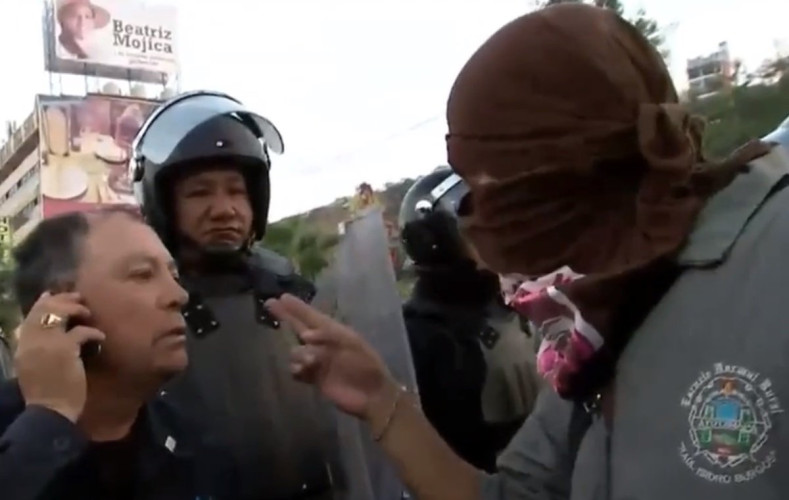Reflections on IGD Mexico, Anarchist Media, and International Solidarity
Social struggles south of the border in so-called Mexico held a somewhat uncomfortable space on IGD. One obvious reason being the language barrier which we sought as a project to overcome, translating voices directly from the ground, collectives, communities, and barrios in resistance in different parts of so-called Mexico. Another factor, one more difficult to face, yet one at the heart of doing international solidarity and media work, is the differing social, political, economic, cultural, and historical contexts throughout so-called North America, and throughout so-called Mexico, which make mutual aid and mutual understanding between spaces and movements more complex.
A quick scan of what we covered on “IGD Mexico” would result in one finding translated statements and communiques from individuals, collectives, and communities in resistance, interviews with frontline organizers and prisoners, calls for solidarity and fundraising, denunciations of repression, etc. The majority of the coverage was focused on Indigenous and campesino communities engaged in struggles for autonomy, self-organization, land and self-defense. This coincides with the overwhelming strength of these communities and movements in so-called Mexico. It also speaks to complex questions of context, communication, and solidarity inherent to transnational organizing and media work.
Struggles for autonomy in so-called Mexico derive from complex and multiple histories, from struggles for self-defense against the state, caciques or narco-groups, in defense of water and forests, for self-determined forms of organization against political parties, etc. They often involve intricate forms of community organization including questions of power, prestige, authority, decision-making, work, land tenure, cargo systems, etc. They often maintain shifting and complex relationships with political parties and unions, police and military forces, the capitalist market, state programs, etc. These complex contexts, histories, and relationships are often lost in the media landscape. Quick romanticization or quick condemnation is often the result.
Mutual understanding and solidarity are further inhibited by privilege, racism, colonization, empire, class, eurocentrism, romanticization, etc. When we look at social struggles in so-called Mexico from the north, we often look at things that fit within our own ideological interpretation of the world and the struggle. We don’t seek to understand movements and struggles on their own self-determined terms, embedded within their complex histories and contexts. The United States is not the center of the world, and the United States experience isn’t the only experience on earth.
One of the primary challenges translating news, statements, and analysis from social struggles in so-called Mexico is also translating the context, trying to develop a deeper understanding of the different actors involved, the historical relations and continuities of resistance and domination. This requires time and commitment. It requires the weaving of relationships of communication, organization, and action with people on the ground. It requires dedication when things aren’t popping off but are at a point of disarticulation or demobilization.
Unfortunately, contemporary movement media is overwhelmingly dominated by social media. Time is reduced and so is deeper analysis and understanding. The masked protestor, the flaming barricade, or the armed actor become a spectacle. The spectacle often clouds a more critical understanding, hindering the possibility for more meaningful communication, organization, and solidarity.
In so-called Mexico, both narco-paramilitary groups and Indigenous communities in resistance can form armed self-defense groups and call themselves as such; both TERFs and anarcho-feminists can mask up and fight police in the streets; both right-wing unions and communities defending their territories can throw down burning road blockades. The relationships, politics, and histories of individuals, collectives, communities, unions, and barrios are complicated. Context matters.
Solidarity has many expressions. One of them is about building long term relationships of mutual aid, support, trust, and confidence. It is about showing up for one another, dedicating time and energy, both when things are at their worst and when things are at their best. It is about carrying out those mundane tasks that nobody wants to do and that often go unnoticed.
Anarchist media can play an important role in all of this. Yet, it can also fall into the logic of the market, seeking quantity over quality, spectacle over meaningful communication, showing up only when things are popping off, using movements to strengthen “the brand” of the media project, and not the media project to strengthen the movements.
Let’s continue asking ourselves: what kind of media do we need in our spaces, in our communities, in our movements? How can our communication projects become integral parts not only of our movements against capitalism, colonialism, patriarchy and the state, but also of the communities, societies, and relationships that we want to embody and cultivate?
The answer to these questions won’t come from this short reflection, nor from a post on an anarchist media project. It will come from the internal organization, discussion, and reflection of the collectives, communities, and barrios in resistance, grounded in their histories, locations, and contexts, derived from their capacity to self-organize, self-reflect, and act.
Get Involved
If you'd like to help with maintaining or developing the website, contact us.
Publish
Publish your stories and upcoming events on Indybay.



